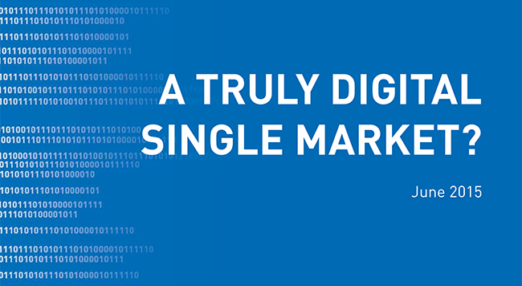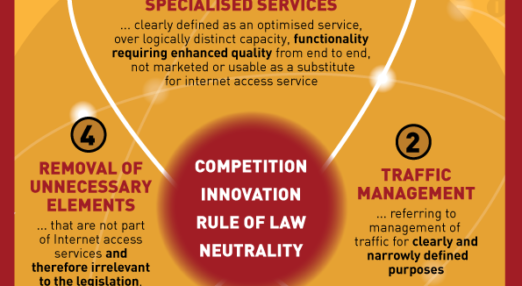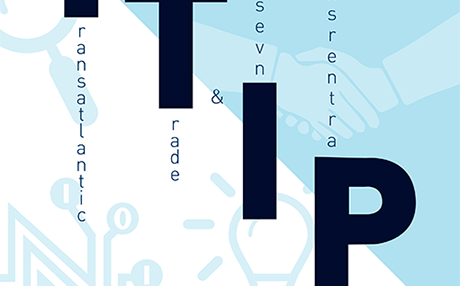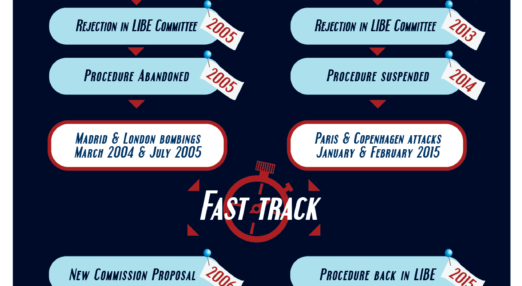Our work
EDRi is the biggest European network defending rights and freedoms online. We work to to challenge private and state actors who abuse their power to control or manipulate the public. We do so by advocating for robust and enforced laws, informing and mobilising people, promoting a healthy and accountable technology market, and building a movement of organisations and individuals committed to digital rights and freedoms in a connected world.
Filter resources
-

EU continues push for travel surveillance by the back door
The European Commission has released its plans for providing financial support to national security measures. These plans, despite the absence of a legal basis, privacy concerns and a pending EU Court of Justice (CJEU) decision, include the financing of a European mass surveillance measure: namely the long-term storage and exchange of citizens’ air travel data, […]
Read more
-

Microsoft’s new small print – how your personal data is (ab)used
Microsoft has renewed its Privacy Policy and Service Agreement. The new services agreement goes into effect on 1 August 2015, only a couple of days after the launch of the Windows 10 operating system on 29 July. The new “privacy dashboard” is presented to give the users a possibility to control their data related to […]
Read more
-

Our overview of the Digital Single Market Communication
This article was originally published on the website of Friends of Europe EDRi has published its analysis of the European Commission’s Digital Single Market Communication (PDF). The European Commission’s launch of its Digital Single Market Strategy is undoubtedly a positive step, but is plagued with ambiguities, contradictions and an overall lack of leadership on key […]
Read more
-

Press Release: European Parliament shows little ambition on copyright reform
The European Parliament’s Legal Affairs Committee approved on 16 June, with 23 votes in favour and 2 against, a non-legislative “Report on the implementation of Directive 2001/29/EC on the harmonisation of certain aspects of copyright and related rights in the information society(2014/2256(INI)), the so-called InfoSoc Directive. This Report covers how the InfoSoc Directive, one of […]
Read more
-

Press Release: Privacy and Data Protection under threat from EU Council agreement
Following today’s meeting of the Justice Ministers Council in Luxembourg where an agreement was reached on the proposal for a General Data Protection Regulation (GDPR), EDRi and Privacy International would like to present the following statement: In January 2012, the European Commission, following extensive consultations, published a draft Regulation. The initiative had three priorities – […]
Read more
-

Council confirms it wants to trade net neutrality for end of roaming charges
Commissioner Oettinger confirmed what European Digital Rights (EDRi) has been fearing from the begining on the so-called “trialogues” on the Telecommunications Single Market Regulation: “Council [is] willing to move on end of roaming if [the European Parliament] engages on all open issues”, Commissioner Oettinger said this morning. The Council is so vehemently opposed to net […]
Read more
-

European Parliament considering yet another compromise on net neutrality
Ahead of the 2014 elections, the European Parliament voted with a large majority in favour of net neutrality and a coherent approach to internet providers’ interferences with our communications. In March 2015, the Council – representing the Member States – adopted its negotiating position which rejected all elements of the Parliament’s text. It removed the definition […]
Read more
-

Booklet: TTIP and Digital Rights
Today, European Digital Rights (EDRi) is publishing its latest booklet, “TTIP and digital rights”: The Transatlantic Trade and Investment Partnership (TTIP) is a trade agreement that is currently being negotiated between the United States and the European Union. TTIP has already raised many concerns among civil society, trade unions, consumer groups, some businesses, and European […]
Read more
-
TTIP and Digital Rights
The Transatlantic Trade and Investment Partnership (TTIP – pronounced “tee-tip”) is a draft trade agreement being negotiated between the United States (US) and the European Union (EU). This booklet presents the concerns that EDRi and its members have regarding TTIP, such as the lack of transparency in the negotiations, respect for the rule of law […]
Read more
-
2015: Consultations of importance to digital rights
The following is a list of consultations that are of particular importance to digital rights in 2015. We will regularly update this blog post with deadlines, EDRi’s responses and other information that might help you respond. The European institutions and international policy-making bodies frequently organise consultations, which are open not only to industry but also […]
Read more
-

Surveillance of air passengers: Letter to Parliamentarians
Today, 4 June, in light of the discussion in the European Parliament Committee on Civil Liberties, Justice and Home Affairs (LIBE) of the amendments for the Passenger Name Record (PNR) proposal, we have sent the following e-mail to all members in the Committee: “Dear Ms/Mr ……, Ahead of today’s debate on the proposed EU-PNR Directive, EDRi […]
Read more
-

Data retention: German government tries again
Even before the parliamentary summer recess starting on 4 July, the German government wants to push a national law on data retention through the German Bundestag. After the Ministry of Justice presented so-called guidelines in mid-April, and a complete draft law only a month later, the Parliament is now supposed to debate and pass this […]
Read more
